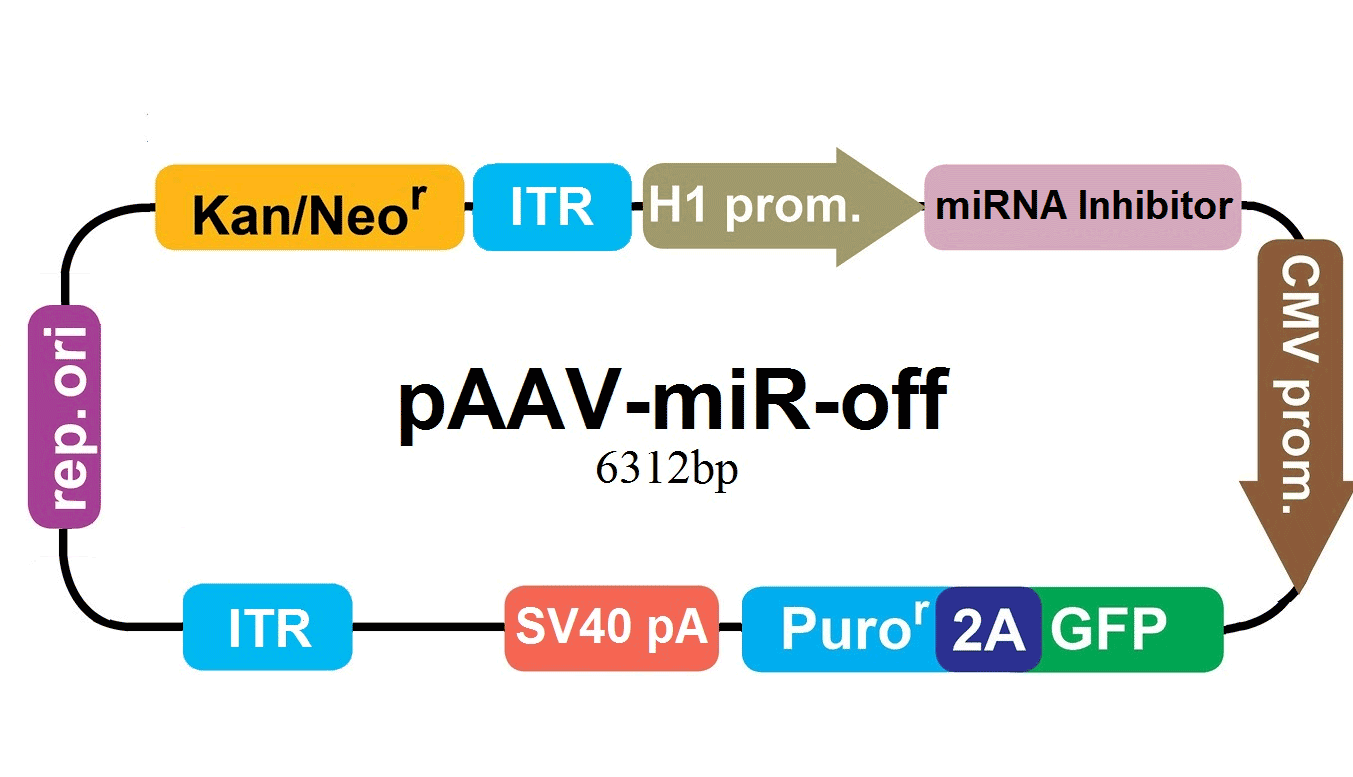AAV miRNA Inhibitors
miRNA inhibitors block miRNA regulation of target gene expression by stable suppression and can knock down native miRNA expression in cells. They can be used in miRNA loss-of-function studies, miRNA target site identification and validation, and miRNA screening experiments. abm's AAV miRNA inhibitors are an excellent choice for transient expression with low immunogenic response.
Key Features
- We offer a collection of miRNA Inhibitors for knockdown of over 5000 miRNAs from human, mouse, and rat.
- AAV delivery for low immunogenicity and non-integrating expression of miRNA inhibitors.
- Available as AAV serotypes 1 to 10 for high transduction efficiency in a variety tissues.
Popular in This Category
- ViralPlus Transduction Enhancer
- pAAV-miR-Off-Blank Control Vector
- AAV-miR-Off-Blank Control Virus (Serotype 1)
Search miRNA Inhibitor Library
AAV miRNA Inhibitor Library
We offer miRNA inhibitor AAVs for inhibiting miRNAs from human, mouse and rat.
Can’t find the miRNA or inhibitor you’re looking for? Request a custom miRNA construct with technical@abmgood.com.
Product Information
Documents
Top Publications
| 01 | MicroRNA-377 Regulates Mesenchymal Stem Cell-Induced Angiogenesis in Ischemic Hearts by Targeting VEGF. Wen, Z et al. Plos One 9 (9):e104666 (2014). doi:10.1371/journal.pone.0104666 |
| 02 | MicroRNA-146a induces immune suppression and drug-resistant colorectal cancer cells. Tumor Biology 39(5):1-12 (2017). doi:10.1177/1010428317698365 |
| 03 | Down-Regulation of eIF4GII by miR-520c-3p Represses Diffuse Large B Cell Lymphoma Development. Mazan-Mamczarz, K et al. PLoS Genet. 10(1):e1004105. (2014) doi: 10.1371/journal.pgen.1004105 |
FAQs
| What is the Sanger miRBase Sequence Database? |
|
miRBase is a sequence database that has been established by the Sanger Institute. Each entry in the microRNA Registry represents a predicted hairpin portion of a microRNA transcript (termed mir in the database), with information on the location and sequence of the mature microRNA sequence (termed miR). The database provides microRNA gene hunters with unique names for novel microRNA genes prior to publication of results and a searchable database of published microRNA.
|
| When was the latest update of your array sequences? |
|
The content of our arrays has been updated to miRBase Release 16.0.
|
| Can I quantify mature miRNA in total RNA using your cDNA synthesis and kit and qPCR master mix? |
|
Yes, that is what it is designed for.
|
| Which genes are targeted by a specific miRNA? |
|
You can search for predicted and validated miRNA target genes at http://mirbase.org/.
Just type in your miRNA name (eg. hsa-mir-145) or accession number in the search bar and look for the targeted genes. |
|
Both scrambled and blank controls are effective negative controls. However, there are debates over off-target effects when using scrambled sequences. By using a blank vector as negative control, the off-target effect can be eliminated. If your experiment requires a scrambled control over a blank control, we can custom make that for you as well upon request.
|
| Do I need to use an internal control primer for quantitative detection of miRNAs (the same as housekeeping primers which we use in qPCR for mRNAs detection)? |
|
For human miRNA plates, the controls are as follows:
1) SNORD44, cat MPH00003 2) SNORD47, cat MPH00004 3) SNORD48, cat MPH00005 4) U6-2, cat MPH00001 |
| How does miRNA inhibitor adenovirus work? |
|
The miRNA inhibitor is in the form of a short hairpin which is complementary to the mature miRNA sequence that it targets. Its expression is under the control of the H1 promoter in an Adenovirus vector. The packaged adenovirus can be used to transfect your target cells and deliver the miRNA inhibitor into the cells and knockdown its target mature miRNA.
|




